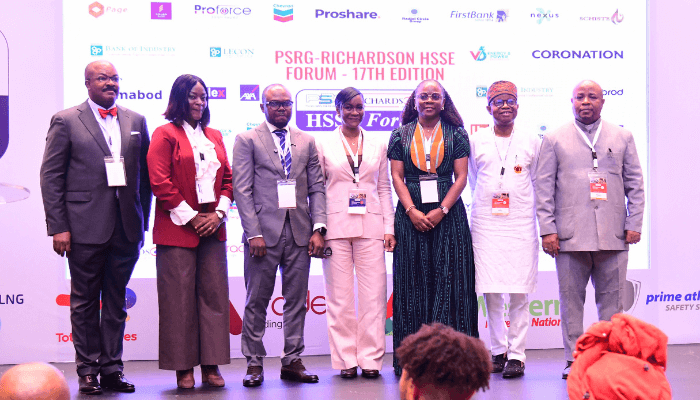Nigeria’s bid to reclaim its status as the Gulf of Guinea’s energy powerhouse dominated discussions at the 17th PSRG-Richardson Health, Safety, Security, and Environment (HSSE) Forum, where top industry executives urged fresh incentives, deeper collaboration, and human capital investment to drive growth in Africa’s largest oil producer.
Held in Lagos on September 16–17, 2025, the two-day hybrid conference, themed “Nigeria: The Gulf of Guinea’s Energy Hub – Mapping the Pathway,” gathered leaders from oil, gas, and allied industries to explore practical measures for reviving exploration, improving safety standards, and restoring investor confidence in the sector.
The Forum, a joint initiative between Lagos-based Richardson Oil & Gas Limited and Process Safety & Reliability Group (PSRG) of Houston, USA, has grown into one of West Africa’s most influential energy gatherings since its inception in 2009. It provides a platform for HSSE professionals to share insights and craft solutions to the operational and environmental challenges facing the industry.
“Nigeria needs to accelerate its human capital development to bridge the gap in HSE practice across all sectors,” said Akin Osuntoki, managing director and CEO of Richardson Oil & Gas. “This forum is about building Nigerian capacity, fostering government-industry-academia collaboration, and positioning the country to lead in energy and safety innovation.”
Delivering the keynote address, Adegbite Falade, managing director and CEO of Aradel Holdings, called for a bold plan to lift Nigeria’s crude output from around 1.8 million barrels per day to 4 million barrels. He said achieving that target would require policy incentives to unlock exploration, attract capital, and strengthen the service sector.
He also urged government and private players to “incentivize the return of international service contractors” while encouraging mergers among indigenous companies to build scale and competitiveness. Falade proposed developing fully integrated service hubs across Port Harcourt, Warri, Uyo, and Lagos to support upstream and downstream activity.
The 2025 edition was chaired by Olanrewaju Kalejaiye, CEO and managing director of ND Western Limited, representing Layi Fatona, chairman of Renaissance Africa Energy Company, who noted that safety and sustainability remain “central to unlocking Nigeria’s full energy potential.”
The event attracted support from leading industry names including NLNG, TotalEnergies, Chevron Nigeria, Bank of Industry, Atlantic Marine & Oilfield Services, Access Bank, Aradel Holdings, Prime Atlantic Safety Services, FirstBank, ND Western, GCA Energy, and NEXIM Bank.
Read also: Analysing Nigeria’s energy transition plan
Speakers from the sector — among them Humphrey Okposo of Atlantic Marine, Weyimi Metseagharun of NLNG, Victor Bandele of TotalEnergies, Obi Uzu of the Petroleum Technology Association of Nigeria (PETAN), and Christopher Osarumwense of the Oil & Gas Trainers Association of Nigeria (OGTAN) — highlighted the need for stronger HSSE integration across energy operations and infrastructure.
A major highlight of the conference was the launch of the PSRG-Richardson Job Fair, designed to bridge the gap between academia and industry. The fair, inaugurated by Afolabi Lesi, deputy Vice-Chancellor (Development Services) of the University of Lagos, created direct engagement between students and employers, offering pathways for graduate trainee and internship placements.
The Forum also celebrated academic excellence through the Bode Osunkoya Prize, instituted in honour of the late Chairman of Richardson Oil & Gas.
The 2025 winners were Oluwaseyi Amaize, a final-year Chemical Engineering student (First Prize, $1,000); Justice Esiri, Mechanical Engineering (Second Prize, $750); and Ojo Babajide Favour, Pharmacy (Third Prize, $500). Amaize presented his award-winning paper before an audience of industry executives and academics.
Organisers said the 2026 edition will extend discussions beyond Nigeria to deepen regional collaboration around local content, digital transformation, safety innovation, and climate adaptation — reinforcing the Forum’s position as the Gulf of Guinea’s leading HSSE knowledge platform.
The PSRG-Richardson HSSE Forum, now in its 17th year, continues to bridge the gap between policy, practice, and innovation — setting the tone for Nigeria’s energy transition and its quest to become the Gulf of Guinea’s dominant hub.

